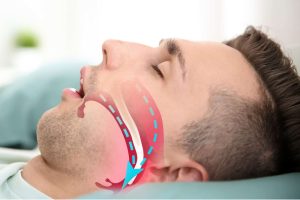 Sleep apnea is a common sleep disorder that can have a significant impact on a person’s overall health and quality of life. It is characterized by interrupted breathing during sleep, which can result in a lack of oxygen to the brain and other parts of the body. While there are various treatments available for sleep apnea, one alternative therapy that has gained attention is hypnotherapy. In this article, we will explore how hypnotherapy can help with sleep apnea and improve sleep quality.
Sleep apnea is a common sleep disorder that can have a significant impact on a person’s overall health and quality of life. It is characterized by interrupted breathing during sleep, which can result in a lack of oxygen to the brain and other parts of the body. While there are various treatments available for sleep apnea, one alternative therapy that has gained attention is hypnotherapy. In this article, we will explore how hypnotherapy can help with sleep apnea and improve sleep quality.Understanding Sleep Apnea
Before diving into how hypnotherapy can help with sleep apnea, let’s first understand what sleep apnea is and its symptoms. Sleep apnea is a sleep disorder where a person’s breathing repeatedly starts and stops during sleep. There are two main types of sleep apnea: obstructive sleep apnea (OSA) and central sleep apnea (CSA).
- Obstructive Sleep Apnea (OSA): This type of sleep apnea occurs when the muscles at the back of the throat relax and block the airway, leading to pauses in breathing.
- Central Sleep Apnea (CSA): Central sleep apnea is caused by a lack of communication between the brain and the muscles that control breathing. It is less common than OSA.
Common symptoms of sleep apnea include loud snoring, gasping for air during sleep, frequent awakening, and excessive daytime sleepiness. If left untreated, sleep apnea can lead to serious health complications such as high blood pressure, heart disease, and stroke.
Traditional Treatments for Sleep Apnea
The primary goal of treating sleep apnea is to ensure regular breathing during sleep and improve sleep quality. Traditional treatments for sleep apnea include lifestyle changes, continuous positive airway pressure (CPAP) machines, and surgical interventions.
-
Lifestyle Changes: For mild cases of sleep apnea, lifestyle modifications such as weight loss, quitting smoking, avoiding alcohol and sedatives, and sleeping on your side can help alleviate symptoms.
-
Continuous Positive Airway Pressure (CPAP): CPAP machines are commonly used to treat moderate to severe sleep apnea. The machine delivers a constant flow of air through a mask, keeping the airway open during sleep.
-
Surgical Interventions: In some cases, surgical procedures may be necessary to remove excess tissue, reposition the jaw, or address other structural issues that contribute to sleep apnea.
While these traditional treatments can be effective, some individuals may seek alternative therapies like hypnotherapy to complement or replace traditional treatment methods.
What is Hypnotherapy?
Hypnotherapy is a therapeutic technique that uses hypnosis to induce a relaxed and focused state of consciousness. It aims to access the subconscious mind to bring about positive changes in thoughts, behaviors, and emotions. During a hypnotherapy session, a trained hypnotherapist guides the individual into a state of deep relaxation and heightened suggestibility. In this state, the individual is more open to suggestions and can explore and address underlying issues that may contribute to sleep apnea.
Hypnotherapy is a safe and non-invasive approach that can be used alongside conventional medical treatments for sleep apnea. It offers a holistic approach to addressing the underlying causes of sleep apnea, such as stress, anxiety, and unhealthy sleep patterns.
How Hypnotherapy Can Help with Sleep Apnea
Hypnotherapy can be beneficial for individuals with sleep apnea in several ways. Here are some ways hypnotherapy can help improve sleep quality and manage sleep apnea:
Relaxation and Stress Reduction
One of the primary objectives of hypnotherapy is to induce a state of deep relaxation. By guiding individuals into a relaxed state, hypnotherapy can help reduce stress and anxiety, which are common contributors to sleep apnea. Chronic stress and anxiety can disrupt sleep patterns and exacerbate sleep apnea symptoms. Hypnotherapy techniques such as visualization, deep breathing exercises, and progressive muscle relaxation can help individuals achieve a relaxed state, promoting better sleep quality.
Addressing Underlying Emotional Factors
Hypnotherapy can also help individuals explore and address any underlying emotional factors that may contribute to sleep apnea. Emotional issues such as unresolved trauma, anxiety, or depression can manifest as sleep disturbances, including sleep apnea. By accessing the subconscious mind, hypnotherapy can help individuals identify and resolve these emotional factors, leading to improved sleep patterns.
Modifying Sleep Behaviors
Hypnotherapy can assist individuals in modifying their sleep behaviors and establishing healthier sleep habits. Through suggestion and visualization techniques, hypnotherapists can guide individuals to adopt positive sleep practices, such as maintaining a consistent sleep schedule, creating a relaxing bedtime routine, and creating a sleep-conducive environment. By reinforcing these behaviors at a subconscious level, hypnotherapy can help individuals establish healthier sleep patterns.
Enhancing Positive Beliefs and Attitudes
Beliefs and attitudes about sleep can significantly impact sleep quality. Negative beliefs, fears, or anxieties surrounding sleep can contribute to sleep disturbances and exacerbate sleep apnea symptoms. Hypnotherapy can help individuals reframe negative beliefs and attitudes about sleep into positive ones. By cultivating positive beliefs and attitudes, individuals can develop a healthier mindset towards sleep, leading to improved sleep quality.
Improving Breathing Techniques
Another way hypnotherapy can help with sleep apnea is by improving breathing techniques. Breathing exercises and techniques taught during hypnotherapy sessions can help individuals learn how to clear their airways and promote better airflow during sleep. By practicing these techniques regularly, individuals with sleep apnea can experience a reduction in symptoms and improved sleep quality.
Complementing CPAP Treatment
For individuals using continuous positive airway pressure (CPAP) machines, hypnotherapy can be used as a complementary therapy to improve the overall experience of using the machine. Hypnotherapy can help individuals become more comfortable with wearing the CPAP mask, reduce any anxiety or discomfort associated with its use, and increase adherence to treatment.
Empowering Self-Care and Self-Management
Hypnotherapy empowers individuals to take an active role in managing their sleep apnea and overall well-being. By teaching self-hypnosis techniques, individuals can learn to self-soothe, relax, and manage stress and anxiety on their own. This self-care aspect of hypnotherapy can be particularly beneficial for individuals who may experience anxiety or fear associated with sleep apnea.
Promoting Mind-Body Connection
Hypnotherapy emphasizes the mind-body connection, recognizing that thoughts and emotions can impact physical well-being. By promoting a positive mind-body connection, hypnotherapy can help individuals develop a deeper awareness of their bodies and their sleep patterns. This increased awareness can enable individuals to make conscious choices that support better sleep and overall health.
Incorporating Hypnotherapy into Sleep Apnea Treatment
If you are considering incorporating hypnotherapy into your sleep apnea treatment plan, here are some steps to take:
- Consult with a Healthcare Professional: It is essential to consult with a healthcare professional, such as a sleep specialist or pulmonologist, before incorporating hypnotherapy into your treatment plan. They can provide guidance and ensure that hypnotherapy is appropriate for your specific condition.
- Find a Qualified Hypnotherapist: Look for a qualified hypnotherapist who specializes in sleep disorders or has experience working with individuals with sleep apnea. Ensure that the hypnotherapist is certified and has received proper training.
- Discuss Your Goals and Expectations: During your initial consultation with the hypnotherapist, discuss your sleep apnea symptoms, treatment goals, and expectations. This will help the hypnotherapist tailor the sessions to address your specific needs.
- Attend Hypnotherapy Sessions: Attend regular hypnotherapy sessions as recommended by your hypnotherapist. The number of sessions required may vary depending on the individual and the severity of sleep apnea.
- Practice Self-Hypnosis: Work with your hypnotherapist to learn self-hypnosis techniques that you can practice independently at home. These techniques can help you manage stress, promote relaxation, and improve sleep quality.
- Monitor Your Progress: Keep track of your sleep patterns and any changes in sleep apnea symptoms as you incorporate hypnotherapy into your treatment plan. Discuss your progress with your healthcare professional and hypnotherapist to ensure that you are on the right track.
Remember that hypnotherapy is not a standalone treatment for sleep apnea. It should be used in conjunction with other medical treatments and lifestyle modifications recommended by your healthcare professional.
Hypnotherapy can be a valuable tool in managing sleep apnea and improving sleep quality. By addressing underlying emotional factors, promoting relaxation, modifying sleep behaviors, and enhancing positive beliefs and attitudes, hypnotherapy offers a holistic approach to sleep apnea treatment. If you are interested in incorporating hypnotherapy into your sleep apnea treatment plan, consult with a healthcare professional and find a qualified hypnotherapist who can guide you on your journey to better sleep. Remember, better sleep is within reach, and hypnotherapy can be a powerful ally in achieving it.
Contact Caroline (904-674-1689) for a Free Consultation
—
 About Happy Healthy Hypnosis
About Happy Healthy Hypnosis
Caroline can help you lose weight, sleep better, relax, perform at your peak, and much more! Hypnosis is a powerful natural, safe, effective and proven method to relieve long-standing problematic habits that keep you suffering. Caroline has been helping people since 2005. She loves watching people transform and get their lives back on track.
> Learn More
